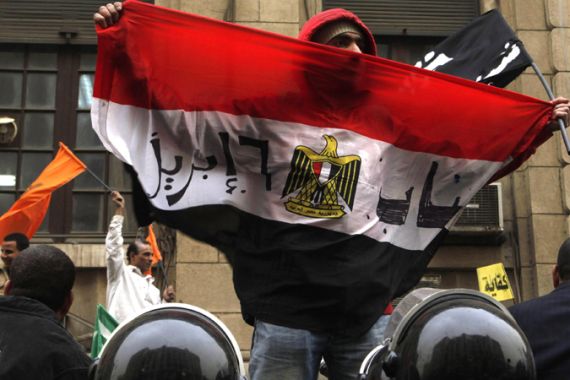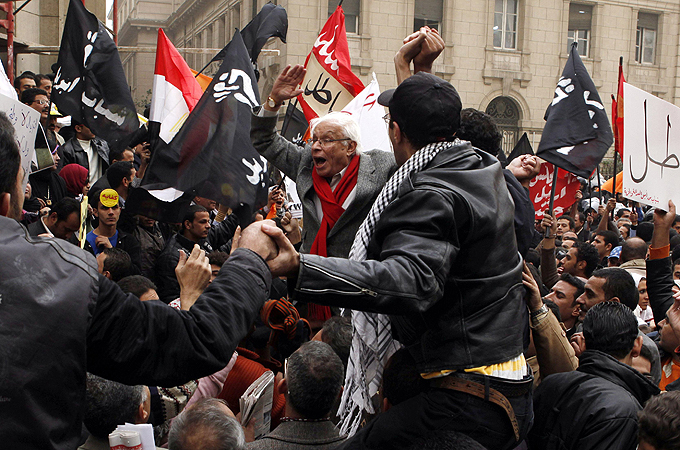Egyptian opposition mounts protest
Opposition groups in Cairo stage demonstration against election result as president rejects claims the poll was rigged.

 |
| Security forces surrounded the demonstrators but allowed the protest to go ahead [Reuters] |
Hundreds of Egyptian activists and members of opposition groups have protested against what they said were violations during last month’s parliamentary vote that handed victory to the ruling National Democratic Party (NDP).
Sunday’s protest in Cairo, the capital, included members of the Muslim Brotherhood and Wafd party.
Referring to the parliamentary votes which took place on November 28 and December 5, the protesters chanted: “Void, void, void. This is not a council. It is a cabaret.”
Security forces surrounded the demonstrators, who included members of the smaller opposition movements Enough and April 6, but allowed the protest to go ahead.
The Brotherhood and other opposition groups say the elections were fraudulent, while Hosni Mubarak, the Egyptian president, on Sunday dismissed allegations that the election was rigged and said any violations were too minor to undermine its legitimacy.
The Brotherhood, Egypt’s biggest opposition bloc in the outgoing parliament, won only one seat this year, compared to a fifth of the total seats in 2005.
It boycotted the second round of the vote after it failed to win any seats outright in the first stage and refused to acknowledge the seat awarded to one of its members in the run-off.
Egypt’s second biggest opposition group in the last parliament, the liberal Wafd party, also withdrew and refused to acknowledge the six seats it won, calling on successful candidates to choose between the party and the parliament.
The opposition groups and independent monitors say the elections were hit by ballot stuffing, voter intimidation and other abuses. But government officials said the process was fair.
“These violations do not invalidate the fact that elections took place in most constituencies according to the law … and without any violence, deviations or violations,” Mubarak said on Sunday, in his first public appearance since the vote.
“As the president of Egypt, I wish the remaining parties had achieved better results, and would have preferred it if their efforts had not gone into arguments about boycotting the vote.”
Al Jazeera’s Ayman Mohyeldin, reporting from Cairo, said that a large percentage of Egyptians believe the elections were rigged.
“There’s certainly a great deal of skepticism about the incoming parliament to be sworn in,” our correspondent said.
‘Parallel parliament’
Meanwhile, about 100 former Egyptian parliamentarians have announced the formation of a “parallel parliament,” agreeing on a “road map” to overthrow the new parliament.
Sobhi Saleh, a former Muslim Brotherhood MP, said on Saturday that the new parliament was “constitutionally invalid”.
Dozens of former MPs who lost the election stated their plan for a series of actions, at home and abroad, committed to the formation of an alternative parliament.
They have invited all political parties to an extended conference to examine ways to invalidate the new parliament and agree on a programme of political, economic, and social reform.
Mustafa Bakri, a former deputy, told Al Jazeera that Mubarak should intervene by dissolving the new parliament in light of the violations during recent elections.
He called for free elections under the safeguards agreed upon by the international community.
Alaa Abdel Moneim, a former deputy from the Wafd party, said the deputies had decided to set up a factual database of violations for submission to relevant international organisations.
NDP control
Protests increased in Egypt before the parliamentary vote, and activists have threatened more action before presidential elections due next year.
But demonstrations rarely number more than a few hundred and are usually quickly quashed by security forces.
Analysts say Mubarak’s NDP was eager to remove opponents from parliament to ensure a quiet presidential vote next year.
The NDP won about 80 per cent of seats compared with about 70 per cent in the last parliament.
Mubarak, 82, and in power since 1981, has not said if he will seek a sixth term in the election, expected to take place in the second half of 2011.
Opposition leaders hope to boost their chances of uniting in a new front to increase pressure on the ruling party and make it more difficult to transfer power to Gamal Mubarak, the president’s son .